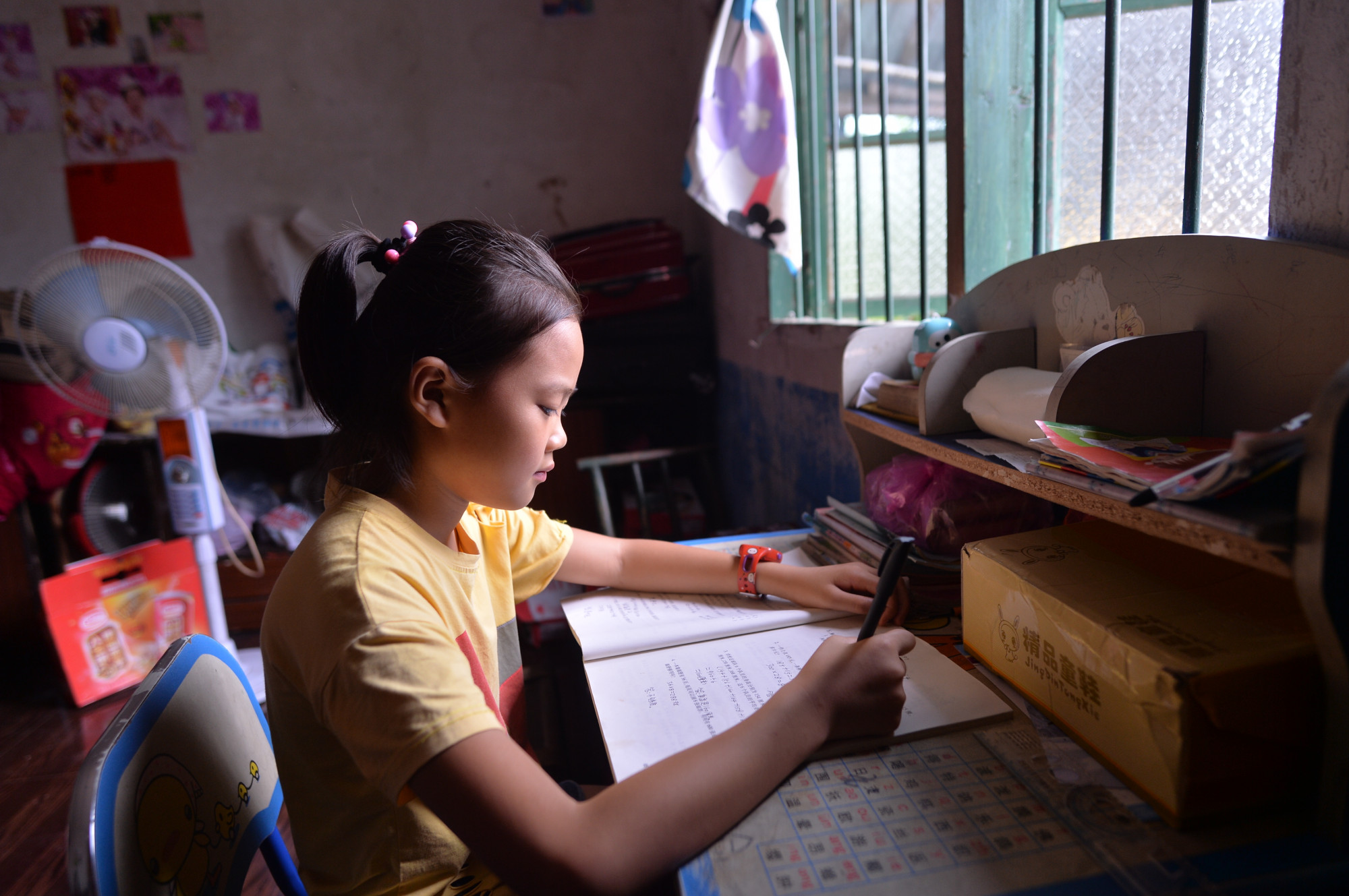

"I want to go to school, because I want to draw closer to that glimmer of hope in my heart."
Coming to the end of a term’s studies, while students from the city are eagerly awaiting for their summer vacation, there are students from impoverished mountain communities who do not understand the beauty of summer, as the very prospect of returning to school next term is still an unknown to them.
Living in mountain communities, they have been close friends with farmsteads, rivers, fields and animals since young, they have been helping their parents with farm work and are deeply connected to every member of their family. They have never complained about their tattered clothes, or the unsavory taste of the cornbread, because these are already providing them with the greatest satisfaction when compared to not having enough clothes to keep warm or food to fill their stomachs.
Since the first time they carried their shabby school bags, held their textbooks in hands, looked into their teachers’ eyes, and used the word ‘classmate’ to address kids they have played with for years……. they have fallen in love with learning, in love with teachers’ red markings and in love with the wonderful world of knowledge which could lead them to a better world.
However, families’ heavy medical expenses and their siblings’ tuition fees are placing hurdles to their dreams, they are forced to drop out of schools and to give up their ambitions. Children have no option but to take up gruelling work and use with their young tender hands to support their families’ future.
In 2005, the state adopted the ‘Two Exemptions One Subsidy’ initiative, the scheme targeted at poverty-stricken rural households and it aimed at alleviating the heavy financial burden of school fees and educational materials as well as subsidising other of their living expenses. However, the lack of financial resources coupled with the emphasis put on the direct running of schools, not only did the scheme not solve rural children’s schooling problem, but it also created even heavier financial burden. The situation where children are deprived of education remained serious.
Receiving an education is a luxury and also a hope for them. These hopes are like stars. When that star started to shine and shed its light in a children’s world, they lit up not only the mountains, but also their the future and dreams that they have yearned for.
It is often said that knowledge can change fate. They deserve our attention, they need us to lend them a helping hand, so that they can be a step closer to the star that have embedded in their hearts, so that they can have the chance to realize their dreams.
“The Blackboard Bursary Scheme”
By donating $60 per month, you can sponsor a child’s education and living expenses for a whole academic year, and continue a child’s dream of education!
Join us and help the children to catch the stars with our collective effort!
"isn’t the state providing compulsory education? Why do we need to support them through bursaries?"
There are only limited beneficiaries of the state’s ‘Two Exemptions One Subsidy’ initiative
In 2005, the state implemented the "Two Exemptions One Subsidy" initiative for rural students in compulsory education at primary and junior high school levels. "Two Exemptions One Subsidy" (which applies to students from poor families) refer to the provision of free textbooks, exemptions from various expenses, and subsidization of living expenditures for students attending boarding schools. However, due to a lack of financial resources, the number of beneficiaries and the subsidized amount are both very limited.
The Centralized school policy suspends village schools
Simultaneously, with the implementation of the centralized school policy, many village schools were suspended. Therefore, many students had to study in town schools and were forced to live in boarding schools, staying in boarding school 5 days per week, what comes after is the dramatic increase in different sundries expenses, accommodation fees and living expenses. Many impoverished families were unable to afford such huge costs, and hence, the situation where children are deprived of education remained serious.
Healthcare expenditure increases the financial burden on families
Access to health care in rural villages is difficult and medical expenses for rural villagers are huge. If family members unfortunately fall sick, the exorbitant cost of healthcare would weigh down even more heavily on their families, leaving them unable to send their children to school, and forcing their school-age children to go out and work.
Strong support from local teams
It is IRD’s mission to solve the out-of-school issue in rural villages, we believe that, children in rural villages deserve the opportunity to receive education, we therefore have set this as our target, and have long been implementing “The Blackboard Bursary Scheme”, up till now, the program has sponsored more than 1356 students. The bursary scheme covers a wide range of regions, from Baojing County, Guzhang County, Yongshun County and Sangzhi County in Hunan Province to Yanhe County in Guizhou province. Workers and volunteers in IRD teams are all from local communities, so they have a better understanding about the living and learning conditions of the beneficiaries, which is helpful when providing assistance to students on education and their daily lives.
Transparent and open background inspections
Local workers will carry out site visits and inspections to ensure assistance provided is arriving where it is needed. IRD staff in mainland will visit schools of the beneficiaries in person at the beginning of each academic term to give the students the bursary, Besides, they will also conduct home visits to the beneficiaries’ home in teams to obtain latest information about their situations at home, and see if they are facing any difficulties and needed our help. As for students studying abroad in other provinces, they will receive their bursaries in the form of bank transfers, so as to ensure sponsorship would not be restricted in certain regions.
Families’ financial conditions are our top concern
The IRD primarily assists students from families in poor financial conditions, by providing them with better lives and education opportunities, instead of rewarding students with outstanding academic results.
Additional service projects
In addition to the core service projects, the IRD also engage in Left-Behind Children Projects, on-the-ground research schemes, and Internship Programs. We also keep contact with students, such as holding Beneficiaries Gathering to encourage communications between the graduates and current students, as a result, promoting mutual support among them.
Rigorous procedures to ensure donations are applied appropriately.
In order to ensure that our benefactors’ donations can provide genuine help to children in need to receive education, after receiving bursary applications from impoverished students, the IRD will rigorously abide by the following procedures:
Carrying out home visits
Home visits to the families of applicant students are carried out by our local mainland staff members, and we verify that all applications are filled completely and correctly through the confirmations from parties, including village cadres, neighbours and teachers etc.
Approving applications
Further to their evaluations, the mainland Chinese staff members will advise the Hong Kong headquarters whether or not to provide financial assistance, and of what amount.
After the Hong Kong standing committee has reviewed the applications, they will decide whether or not to approve the applications in accordance with the state of company finances.
Delivery of bursaries
Under careful supervision, one of our members of staff will make an in-person visit to hand over the bursary money to either the student or his/her parents, and sign the records as proof of delivery. For those with university or technical secondary school placements, arrangements will be made for the funds to be remitted electronically.
Signing of student bursary notices
Parents and students will sign duplicate copies of the ‘Student Bursary Notice’, which lists the recipient student’s name, the bursary amount and the bursary purpose. Each copy of the Notice will be kept by student’s family and his/her academic institution.
Filling in student files and records
Each student must complete a ‘Student File’ and ‘Student Record’, which are to be submitted to our mainland China office, and within one month after signing for receiving the bursary, the two documents are submitted to our Hong Kong headquarters for archiving.
Student performance record and letter
After the completion of each academic term, benefactors will receive a student performance record and letter, in order to stay informed about the student’s current situation in both their academic and non-academic life.
Visits to bursary-receiving students
Benefactors can join service trip arranged by IRD, and visit bursary-receiving students.
To protect the privacy of students, we don’t provide contact details of bursary-receiving students to benefactors. We can, however, forward letters or small gifts to the students on behalf of benefactors.
Our members will periodically pay visits to the schools and families of bursary-receiving students. If they discover any discrepancies with records, the IIRD reserves the right to investigate any responsibility of signatory parties or individuals through administrative or legal channels.
HKD $60 = x 8 bottles =
x 8 bottles = x 2 bowls =
x 2 bowls =  x 5 bags =
x 5 bags =  the future of a child in rural China
the future of a child in rural China